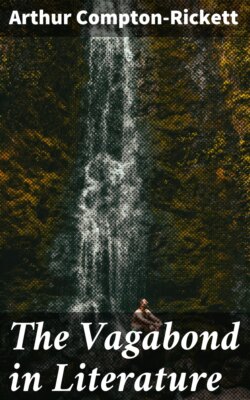Читать книгу The Vagabond in Literature - Arthur Compton-Rickett - Страница 10
На сайте Литреса книга снята с продажи.
VI
ОглавлениеTable of Contents
Many writers who cannot be classed among the Vagabonds gave occasional expression to the Vagabond moods which sweep across every artist’s soul at some time or other. It would be beside my purpose to dwell at length upon these Vagabond moods, for my chief concern is with the thorough-going wanderer. Mention may be made in passing, however, of Robert Browning, whose cordial detestation of Bohemianism is so well known. Outwardly there was far less of the Vagabond about him than about Tennyson. However the romantic spirit may have touched his boyhood and youth, there looked little of it in the staid, correctly dressed, middle-aged gentleman who attended social functions and cheerfully followed the life conventional. One recalls his disgust with George Sand and her Bohemian circle, his hatred for spiritualism, his almost Philistine horror of the shiftless and lawless elements in life. At the same time I feel that Mr. Chesterton, in his brilliant monograph of the poet, has overstated the case when he says that “neither all his liberality nor all his learning ever made him anything but an Englishman of the middle class.” He had mixed blood in his veins, and the fact that his grandmother was a Creole is not to be lightly brushed aside by a Chestertonian paradox. For the Southern blood shows itself from time to time in an unmistakable manner. It is all very well to say that “he carried the prejudices of his class (i.e. the middle class) into eternity!” But we have to reckon with the hot passion of “Time’s Revenges,” the daring unconventionality of “Fifine at the Fair,” and the rare sympathy and discernment of the gipsy temperament in “The Flight of the Duchess.” Conventional prejudices Browning undoubtedly had, and there was a splendid level-headedness about the man which kept in check the extravagances of Vagabondage.
But no poet who has studied men and women as he had studied them, pondering with loving care the curious, the complex, the eccentric, could have failed to break away at times from the outlook of the middle-class Englishman.
Tennyson, on the other hand, looking the handsome Vagabond to the life, living apart from the world, as if its conventions and routine were distasteful to him, had scarcely a touch of the Vagabond in his temperament. That he had no Vagabond moods I will not say; for the poet who had no Vagabond moods has yet to be born. But he frowned them down as best he could, and in his writings we can see the typical, cultured, middle-class Englishman as we certainly fail to see in Browning. A great deal of Tennyson is merely Philistinism made musical. The romantic temper scarcely touches him at all; and in those noble poems—“Lucretius,” “Ulysses,” “Tithonus”—where his special powers find their happiest expression, the attitude of mind has nothing in common with that of the Vagabond. It was classic art, not romantic art, that attracted Tennyson.
Compare the “Guinevere” of Tennyson with the “Guenevere” of Morris, and you realize at once the vast difference that separates Sentimentalism from Romanticism. And Vagabondage can be approached only through the gateway of Romanticism.
